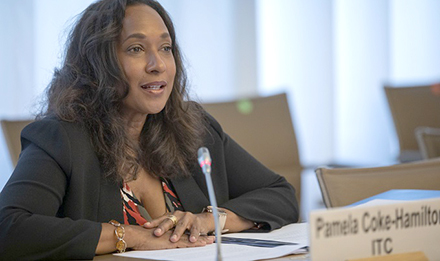The International Trade Centre (ITC) has released a comprehensive report on sustainable markets that finds that a trend towards certified land is expected to continue, especially if producing countries and emerging markets, particularly in Asia, support sustainability trends. The report shares highlights and trends based on data from 14 major sustainability standards for bananas, cocoa, coffee, cotton, oil palm, soybeans, sugarcane, tea, and forestry products. Source: SDG Knowledge Hub
‘The State of Sustainable Markets 2020: Statistics and Emerging Trends,’ provides data on area, production volume, and producers for 14 standard-setting organizations focused on the eight commodities and forestry.
The report finds that the certified farmland of most of the eight crops is expanding: between 2014 and 2018, the certified area of all agricultural commodities covered in the report grew by 52%.
Cotton has the largest certified area: 18.2% of land cultivated for cotton globally is now certified. Cocoa, oil palm, and coffee represent the crops with the next largest areas of certified land. Commodities with the smallest certified area are soybeans, sugarcane, tea, and bananas. Buyers of most of the eight crops are also making progress in establishing and disclosing sustainable sourcing commitments.
Organic represents the biggest sustainability standard for both area and product variety. In 2018, 1.5% of agricultural land worldwide was classified as organic.
In forestry, two standards dominate. The forest area certified by Programme for the Endorsement of Forest Certification (PEFC) continues to exceed the forest area certified by the Forest Stewardship Council (FSC): 7.7% of forest area is PEFC-certified, compared with 4.9% of global forest area certified under FSC.
The report highlights the role of consumer preferences for healthier and more sustainably grown products in driving the rising popularity of certified products like bananas, cocoa, and soybeans.
At the same time, ITC’s Executive Director Pamela Coke-Hamilton cautions against depending “on consumer sentiment alone” to drive sustainability and certification.
Ms Coke-Hamilton recommends engaging with multinational buyers and policymakers to see how they can scale the uptake of sustainability standards across additional goods and countries. Additional driving forces behind growth in sustainability include implementation of risk management strategies by private companies that source commodities from developing countries, and regulatory frameworks that establish commodity sourcing conditions in both producing and consuming countries.
On COVID-19, the authors note that the pandemic has increased stress on exporters of the products analyzed in the report. Within this context, the report emphasizes that voluntary sustainability standards (VSS) can help small and medium-sized enterprises (SMEs) use more environmentally friendly and socially responsible practices while also improving their competitiveness and differentiating their product offerings.
ITC launched this fifth global report at the ITC Good Trade Summit, which took place virtually from 7-8 October on the theme, ‘Emerging Stronger from the COVID-19 Crisis.’
ITC produced the report in collaboration with the Research Institute of Organic Agriculture (FiBL) and the International Institute for Sustainable Development (IISD), with financial support from the Swiss State Secretariat for Economic Affairs.






